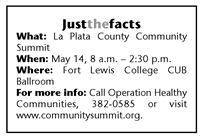|
La Plata County Community Summit convenes this Friday
Sidebar: A look at the
Summit issues
by Missy Votel
 |
| Operation Healthy Communities
La Plata County Community Summit, to be held this Friday at
Fort Lewis College, will once again take a look at the overall
health of the community and examine the biggest issues facing
the area and how to find cooperative, viable solutions to
them./Photo by Julie Bliss. |
Hundreds of people move to La Plata County each year for quality
of life. But, the area is not without its growing pains and problems.
However, local residents will get a chance to assess some of the
more pressing topics facing the area as Operation Healthy Communities
convenes its bi-annual La Plata County Community Summit, held
Friday, May 14, at Fort Lewis College.
 The
summit will be the third such gathering since the local nonprofit
organization held the first community forum in 2001. Operation
Healthy Communities director Laura Lewis said that after the 2002
summit, it was decided to hold the summits every other year to
allow enough time to put into action the plans formulated. The
summit will be the third such gathering since the local nonprofit
organization held the first community forum in 2001. Operation
Healthy Communities director Laura Lewis said that after the 2002
summit, it was decided to hold the summits every other year to
allow enough time to put into action the plans formulated.
“We decided to do it every other year so we could implement
ideas,” she said.
Lewis said the topics for the summit were chosen over five months
based on feedback received from the Operation Healthy Communities
Web site, newspaper ads and presentations to civic groups. She
also said the group conducted meetings with about 100 key community
stakeholders representing a wide array of community members.
“We tried to get a good cross section of the community,”
she said.
Once all the results were in, Lewis said they were narrowed down
based on a certain set of criteria. The main criteria was that
the topic be something that can be worked on at a local level.
“In choosing topics we had to ask ourselves, ‘Is
it actionable locally?’” she said.
For example, Lewis said although something like the Animas-La
Plata project is important to local residents, there is not much
that can be done about it at a local level since it is overseen
by federal agencies.
“We really have no control over something like that,”
she said.
Along that vein, topics were also chosen if a local entity exists
to work on implementing any plans for action that come out of
the summit.
And thirdly, Lewis said the selection committee looked at topics
that needed to be “jumpstarted” – i.e. those
that have been recognized as problems but have not yet been addressed.
“We looked at whether there was anything that we know is
an issue, but nobody knows where to start,” she said.
The topics for this year’s summit include crystal methamphetamine,
child care, water, school safety, health care and community planning.
The daylong event will kick off with a briefing on what has happened
since the last summit as well as a community video presentation.
After that, participants will break into small groups to discuss
one of the six aforementioned topics. As in years past, Lewis
said she expects the summit to meet its 300-person capacity and
then some.
“We’ve been getting about 300 every summit, and even
more show up the day of,” she said.
Due to facility limitations, the 4 summit is not be able to accommodate
all willing participants, but Lewis said nearly all residents
will feel the long-term impacts of the event. Several organizations
are outgrowths of summits past, including the Regional Housing
Authority; the Mental Health Summit Partnership, which trains
law enforcement in handling crisis calls; and the Affordable Housing
Task Force.
“All this stuff comes out of the summit and makes it all
worth it,” she said.
However, she did note that ironically, the ultimate goal is to
someday not need such a summit, or an organization such as Operation
Healthy Communities.
“It’s kind of like a soup kitchen,” she said.
“The goal is that you won’t need it some day.”
But until that day, Lewis said it will be the summit’s
job to help the community recognize the areas it needs to improve
upon and harness that momentum.
“Not only do you have to know what your issues are, but
you need to know how to get people to mobilize,” she said.
“It’s all about facilitating the flow of communication.”
|

